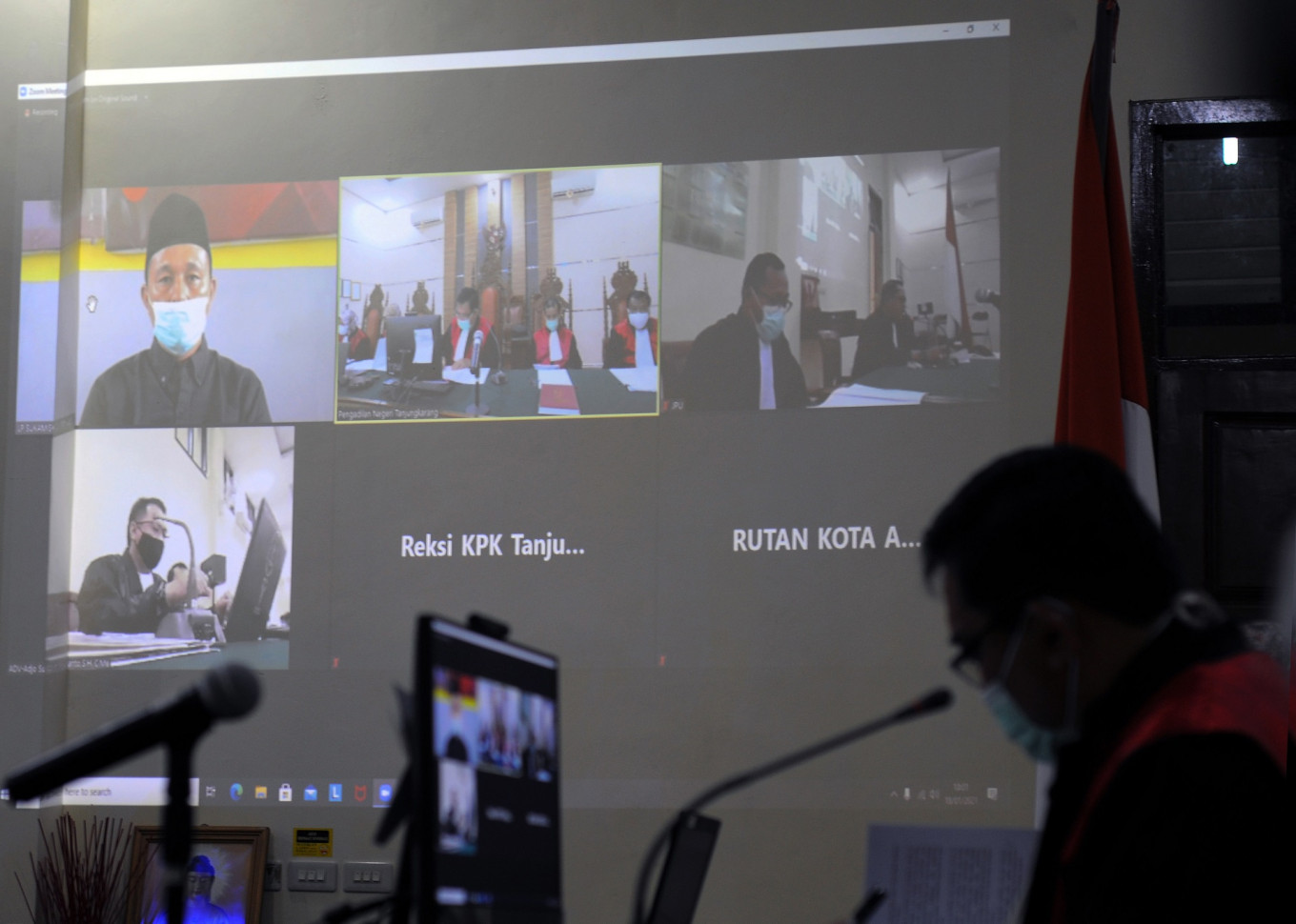Popular Reads
Top Results
Can't find what you're looking for?
View all search resultsPopular Reads
Top Results
Can't find what you're looking for?
View all search resultsThe quest for research-based policy in Indonesia
Many leaders are unaware that they have fallen into the so-called cognitive near-sightedness; taking an instant policy to solve the problem without calculating the holistic implication.
Change text size
Gift Premium Articles
to Anyone
 A judge speaks during a virtual hearing against former Central Lampung regent Mustafa at the Tanjungkarang Corruption Court in Bandar Lampung, Lampung on Jan. 18, 2021. During the hearing, prosecutors read an indictment letter against Mustafa for an alleged bribery pertaining to goods and service procurement projects in the regency. (Antara/Ardiansyah)
A judge speaks during a virtual hearing against former Central Lampung regent Mustafa at the Tanjungkarang Corruption Court in Bandar Lampung, Lampung on Jan. 18, 2021. During the hearing, prosecutors read an indictment letter against Mustafa for an alleged bribery pertaining to goods and service procurement projects in the regency. (Antara/Ardiansyah)
T
he government has repeatedly shown signals that the state's policies have not been based on research, which raises the question of whether the nation's leaders have led the country on the correct trajectory.
Take the example of the current policy on government procurement. In essence, the government designed a policy to prioritize buying domestic products through procurement.
At first glance, this policy is based on good intentions. The government strategy looks logical and relevant since the global economy is facing turbulence due to the COVID-19 pandemic and the Russia-Ukraine war. The idea of the government helping national producers by absorbing domestic products through compulsory procurement is seen as a relevant approach.
I agree that, to a certain extent, the government should nurture the domestic industry by providing incentives. Nonetheless, this should be designed carefully with a clear road map. Otherwise, the policy will create problematic results and attract moral hazards.
Unfortunately, some time ago, President Joko “Jokowi” Widodo delivered questionable, if not unreasonable, instructions to the National Government Internal Auditor (BPKP) at the national coordination meeting of the internal oversight institution. The President told them to allow public institutions to select local products, albeit prices are higher and quality is lower than those offered by foreign producers.
“Buying local products will create added value to the domestic market and absorb local labor,” Jokowi said.
Although the policy was based on good faith, if the price gap is significant, it will result in users getting a smaller amount or number of what is required. Hence, users will not be better off due to shortages resulting from this policy.
Moreover, if the quality of local products is not reliable – let's say its economic life is relatively short or has an easy defect – it will have a negative impact not only on users but also citizens as taxpayers.
Therefore, the above instruction may be challenged from an academic perspective. It is worrying that the instruction is based on personal intuition. Conceptually speaking, many leaders are unaware that they have fallen into a so-called cognitive near-sightedness; taking an instant policy to solve problems without calculating the holistic implications (Nigro and Nigro, 1973).
If the instructions were based on research, it should provide precise guidance on how much higher prices of local products can be tolerated.
The government should also ensure that good intentions will not trigger moral hazards. There will be risks for local producers to act in bad faith by increasing the price of their products or maintaining their previous price with lower-quality as they believe public agencies would buy them anyway under the compulsory government procurement of domestic products.
True, the government has made preventive measures against malfeasance by requiring suppliers to display their products in the government electronic procurement catalog and obliging public agencies to procure only products displayed in the electronic catalog.
Nonetheless, several loopholes remain. First, not all procurements can be facilitated by e-purchasing. It is still possible for the public not to conduct e-purchasing but rather through a procurement method by offering bribes to procurers.
There is also the risk that suppliers offer products at higher prices than they should because the National Public Procurement Agency (LKPP) could loosen rigid procedures to conduct a verification of the product before they are listed in the catalog. The President's instructions to simplify and boost the number of local suppliers listed in the catalog could also trigger a loosening procedure.
The risks cited above make it imperative for the government to base its procurement policy of goods and services on the basis of comprehensive and robust research with clear-cut parameters, otherwise the government procurement programs could waste taxpayers’ money.
***
The writer is a lecturer and researcher on government contract, preventing bureau pathology and comparative administrative law at the School of Law in Gadjah Mada University, Yogyakarta.










